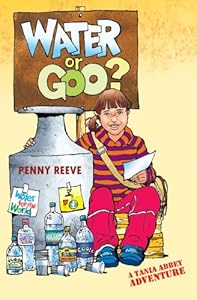 Water or Goo?--that's the question in this Tania Abbey novel by Penny Reeve. It's a pretty important question, although not, one would think, for Australian Tania Abbey.
Water or Goo?--that's the question in this Tania Abbey novel by Penny Reeve. It's a pretty important question, although not, one would think, for Australian Tania Abbey. Tania is a spunky kid, and a bit of a teacher's pet, but one who has a big heart. She adores her teacher, Ms. Flinders, so when the teacher announces there is a water rally in their drought-stricken region of Australia (a problem that really has been happening in the last decade in that country), Tania is the first kid in class to raise her hand saying she wants to participate.
The only problem? Boisterous Tania didn't ask Mum and Dad first. Tania's parents decide she can participate in the rally and subsequently set up a booth, but only if Tania can come up with a good idea to educate others about water. She only has 24 hours to decide, since that's when the entry fee is due.
Enter Tania's best friend, Emily, as well as both kids' siblings. All of the kids throw ideas back and forth, but it's not until Tania goes to use the bathroom at Emily's house and the toilet backs up that she gets a lesson on how people in the third world live--and this sparks an idea that quickly snowballs. How would you like to drink water that someone may have been using in or near the bathroom? And the idea of a booth called "Water or Goo?" is born.
What I Like: There's a lot of good things in this book. Exposing kids--especially American kids who really have no knowledge of what's going on outside their little suburban home--to problems in other areas of the world is great. The initial premise for the water march is the drought in Australia, which, as I mentioned, was an ongoing problem down under when this book was published. But Tania's focus quickly goes from Australia's problems to those in the third world. A girl named Shanti in India is predominantly featured in the book, and I presume she was the subject of an earlier book because she's referred to quite frequently, with Tania wondering how Shanti survives with dirty water, or how she carries multiple vessels of water a long distance to her home daily.
This book offers some possible solutions to the dirty water problem. At the tail end of the book, there's an author's note which provides some additional information about how to help others get clean water, although they're primarily for UK and Australian youth. If, after your child reads this book, they feel moved to help, I would personally urge you to look into the organization "Wells for Life," which is an organization that helps bring new wells to areas of the world in desperate need of clean water. But this is just one of many American organizations bringing clean water sources to the third world.
What I Dislike: Story-wise, there's not much I don't like about this book. The religious content is minimal, but present, so the minimal part would be my only gripe. As a writer, though, I did find the writing a little choppy, but that probably won't bother anyone but the most aware of readers.
Overall Rating: Very good.
Age Appeal: 9-12.
Publisher Info: Christian Focus Publications, 2008; ISBN: 978-1-84550-341-3; Paperback, 94 pgs., $6.99
Buy it at Amazon.com for $6.94
Special Info: This book is written primarily for an Australian audience, and the lingo and spelling reflect that. For instance, "learnt" is used instead of "learned," and "crisps" are used instead of "chips," but there are many other examples throughout the book.







No comments:
Post a Comment